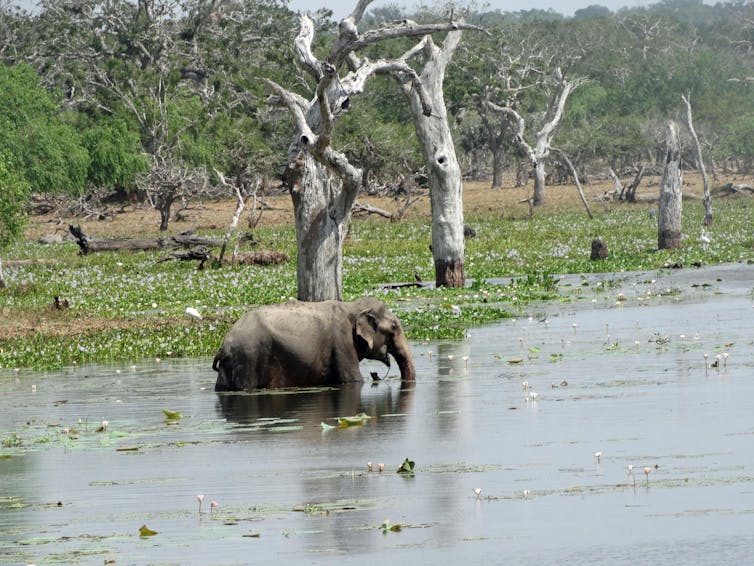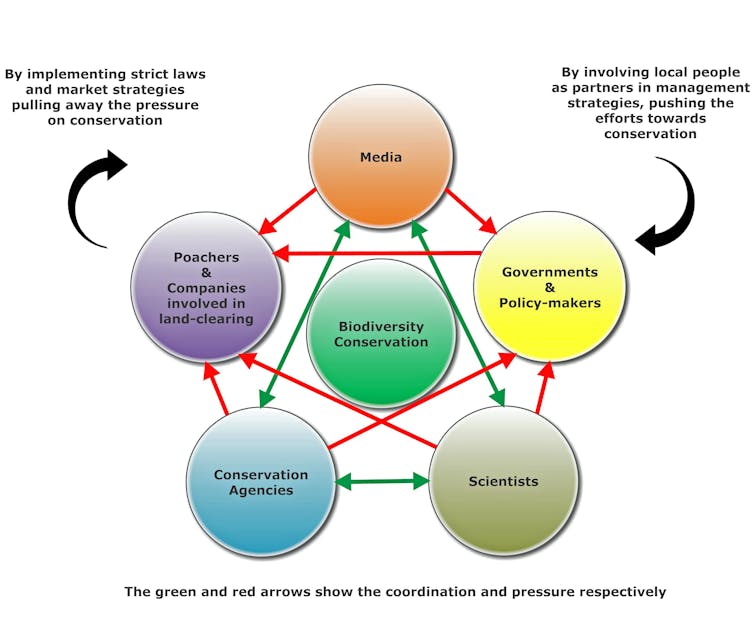This article was originally published on , which features includes relevant and informed articles, written by researchers and academics in their areas of expertise and edited by experienced journalists.
is an instructor professor in the Department of Biology at
The are home to the greatest diversity of plants and animals on Earth. Yet many of these that disregard the rules of democracy and nurture an indefinite influence of corruption.
During the 10 years I’ve worked in tropical countries, I have seen the human toll on biodiversity both . Rare road kills of leopards in Sri Lanka have been mistakenly exaggerated as “organized poaching,” and the systematic smuggling of reptiles in South America and Africa has been distorted as “random attempts.”
Preserving biodiversity in these areas is a real challenge for scientists and conservationists. They collect reliable data, create robust models and project the fate of biodiversity hot spots, but without real access to these locations, practical conservation strategies remain out of reach.
Only an effective network of scientists, local governments and people, conservation groups and honest media can create a clear picture of this biodiversity crisis and work towards a solution.
Can humans and nature coexist?
Instead of spending enormous amounts of money on “” and work, let’s put the dollars towards supporting those living in these bio-diverse hotspots. This would allow them to improve their living conditions and to serve as guardians who keep a watchful eye on poachers.
Already some local governments rely on their villagers to stop wildlife crimes. For example, Tibetan villagers assigned to protect local wildlife have .
But elsewhere, local people are being evicted in the name of wildlife conservation. More than 200,000 people are to be relocated so that can expand its boundaries to give its tigers and endangered Indian rhinos more space. The government says this will help forest rangers deal with poachers and keep innocent villagers from being caught up in the conflict.
But hard-line approaches like this should be directed towards the poachers — not forest dwellers. For the most part, those who live in wild areas harvest only the resources they require. .
This coexistence between people and land is necessary to conserve nature. Governments shouldn’t oust people to conserve nature, but involve them in ecotourism, the conservation decision-making process and proposed management strategies.

Rural Hindus and Buddhists in South Asia consider and protect them. If not, even the hardy species like and might go extinct.
Sincere effort is vital
The political leaders and governments of tropical nations should be encouraged to keep their international reputations by respecting conservation obligations. This can be guaranteed if developed countries provide adequate and performance-based financing. When forest-dwellers can support themselves, they’ll be more willing to help conserve the forests.
Nature’s ecosystem services, such as water purification, pest control and storm buffering, must be more greatly valued than the cash crops that destroy forests and other habitats.
for managing their lands to provide ecosystem services definitely pays off. When local communities have confidence in practical strategies, such as forest habitats, then corruption can be minimized and eventually eliminated.

When coupled with regulations, market-based strategies can also help local residents conserve nature.
In Indonesia, Malaysia and Myanmar, land-owners are tempted to clear land to plant oil palm to meet the high demand for palm oil. Some have suggested that high-yielding varieties might remove the pressure, but others argue that, in the absence of regulation, .
This coupling has worked elsewhere. For example, signed between the local soybean exporting companies in Brazil and the foreign supermarket chains in 2006 significantly reduced clearing forest lands.
Spread the word
Finally, governments, environmental NGOs and research institutes should introduce outreach activities that teach children about conservation.
The principles of biodiversity conservation should be made compulsory in all schools, especially in the countries where it’s a serious concern. This will positively impact students to form strong commitments towards conservation, thus creating a positive atmosphere to nature.
![]() Conservation cannot exist only on paper, it must be translated into practical tasks that can be embraced by those most affected by its future.
Conservation cannot exist only on paper, it must be translated into practical tasks that can be embraced by those most affected by its future.
Read the on The Conversation.
������Ƶ University is a founding partner of The Conversation Canada, a new-to-Canada online media outlet providing independent, high-quality explanatory journalism. Originally established in Australia in 2011, it has had more than 85 commissioning editors and 30,000-plus academics register as contributors. A full list of articles written by ������Ƶ academics can be found on .

